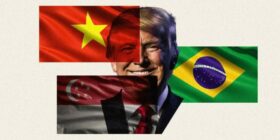MiB: Lisa Shalett, CIO Morgan Stanley
This week, I speak with with Lisa Shalett, Chief Investment Officer and head of Global Investment Office for Morgan Stanley Wealth Management. Previously, she was CEO and chairman at Sanford Bernstein, CIO at Merrill Lynch Asset Management, and now CIO at both Morgan Stanley Wealth Management and runs their asset allocation models and their outsourced chief investment officer models. We discuss the philosophy of managing billions of dollars in assets and wealth management today. Her current reading is […]


